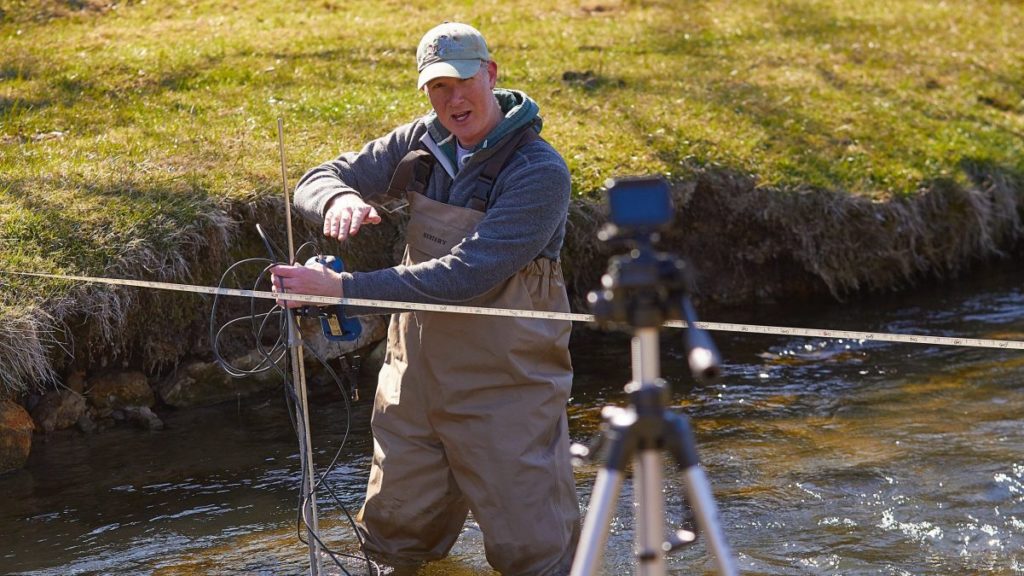
Colin Belby, associate professor of Geography, takes students on a virtual field trip to Bohemian Valley near Coon Valley, Wisconsin. Belby uses a GoPro to record labs for his Earth Surface Processes and Landforms class.
Masks made from paper bags. Outreach to local nonprofits. Remote connections to cutting-edge software.
This is how some UW-La Crosse faculty are engaging their students in remote or online formats in the age of COVID-19.
“Teaching online takes months of planning and preparation, and we had to make the change in just a couple weeks,” says Kristin Koepke, interim director of UWL’s Center for Advancing Teaching and Learning (CATL).
“This was an emergency situation where we had to do things out of the ordinary,” she explains. “But there’s been a lot of creative brainstorming, and faculty are embracing the opportunity to help our students as best we can.”
That’s meant different approaches for different courses and disciplines.
In the Geography and Earth Science Department, faculty found a creative way for students to conduct lab work.
With help from Information Technology Services, the department developed a system for students to remotely log into university computers, allowing them to access professional-quality GIS software from home.
Students use the software for projects such as tracking changes to urban areas and the natural environment over time, or creating maps to display data, such as precise election results.
“There are a lot of free GIS programs online, but we wanted our students to use the higher quality software,” Assistant Professor John Kelly says. “Those free programs wouldn’t have given them the full benefit or the same hands-on experience they’d have at school, or in the workplace.”
“One problem is we’re not there in person if they stumble,” adds Associate Professor Colin Belby, chair of the department, who has even used a GoPro to take students on virtual field trips during the pandemic. “It’s harder to grab ahold of the computer and help them with whatever problem they’re running into.”
Students also don’t have the benefit of working shoulder to shoulder in a computer lab, where they can share ideas and offer feedback on one another’s research.
This new format will never flawlessly replicate the face-to-face experience, says Professor Cynthia Berlin, “but students still come out with useful knowledge and a strong set of skills.”
In many other departments, faculty are rising to meet the challenge.
Associate Professor Christa Kiersch’s human resources students were supposed to design an in-person HR training program for their peers. Now, students are adapting their trainings to be completed online.
Another group of students under Kiersch’s direction are creating a package of online HR tools that will be used by local nonprofits. The students will present their ideas to Great Rivers United Way and other interested groups during a virtual meeting in late April.
Meanwhile, in the Theatre Arts Department, students no longer have access to the fabrics, materials and equipment in the costume shop. Instead, Professor Joe Anderson’s students are concocting costume pieces from objects they found lying around the house: tape, glue, staples, nails, screws, egg cartons, cardboard, pipe cleaners and more.
In another assignment, Anderson has asked his students to craft a decorative mask out of a paper bag and whatever else sparks their imagination.
“I hope they’re able to see how the slightest change in an expression we give a mask can change the entire look,” he says. “It doesn’t have to be a big change or dramatic facial gesture to communicate to an audience what you want to say. Also, I hope this shows them that, sometimes, these things happen very quickly, and they don’t have to angst over every little detail.”
In total, UWL faculty moved more than 2,500 in-person courses to online formats in just two weeks.
While CATL provided the necessary support, Koepke says the smoothness of the transition is a testament to the dedication of staff and faculty, and their willingness to work together.
“I think our university did a really great job of being proactive,” she says. “We’re doing our best to be ahead of, and stay ahead of, the game.”
